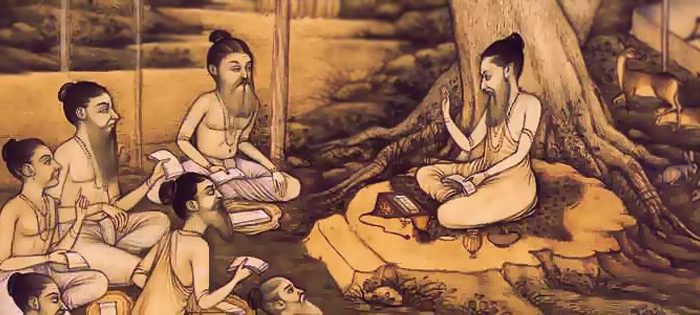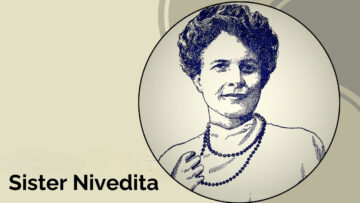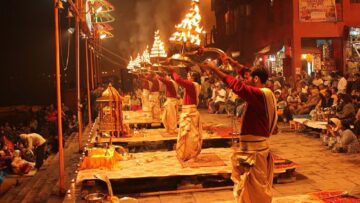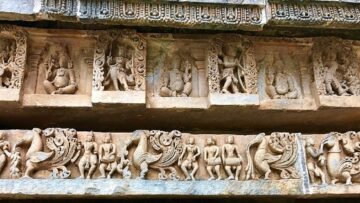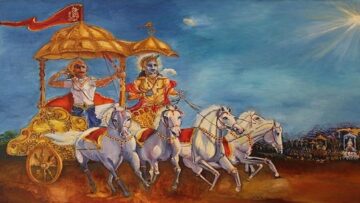In the previous article, I sketched the life accounts of Rishis like Bharadvāja, Agastya, Bhrigu, Dadhīchi, Pippalāda, Āruṇī, and Mudgala and how these accounts teach us regarding forgiveness, charity, Guru-Bhakti, among other things. Now let us look into the life accounts of a few more Rishis.
Maharshi Vālmīki – the Author of Ramayana
Rishi Valmiki is called the ‘Ādi Kavi’ or the first poet in the Sanskrit language. He wrote the Ramayana, the story of the life of Lord Rama in 24,000 verses. The Ramayana has become so popular that even outside India, people in many countries like Indonesia, Thailand, Burma, Laos, Malaysia, China, and Japan have their own versions of Ramayana based on Rishi Valmiki’s original version.
Thousands of years ago, a dacoit named Ratnākara (also called Valya Koli) lived in the forests of north India. He earned his living by robbing and killing travelers, who were passing through the forest. He would steal their belongings and food and take them home to feed his own children and wife.
 One day, Sage Nārada was passing through the forest. Suddenly, Valya came from behind a bush and threatened to kill Nārada, unless he gave up his belongings. Nārada asked Valya as to why he lived this life of robbing and killing. “To feed my family,” replied Valya. Nārada then asked him, “Don’t you know, it is a bad crime to kill and steal from others? You will get bad Karma (i.e. fruit of action), and suffer punishment for it later. Will your family also share your bad Karma with you just like you share your loot with them?”
One day, Sage Nārada was passing through the forest. Suddenly, Valya came from behind a bush and threatened to kill Nārada, unless he gave up his belongings. Nārada asked Valya as to why he lived this life of robbing and killing. “To feed my family,” replied Valya. Nārada then asked him, “Don’t you know, it is a bad crime to kill and steal from others? You will get bad Karma (i.e. fruit of action), and suffer punishment for it later. Will your family also share your bad Karma with you just like you share your loot with them?”
“Of course, I will go and ask them and confirm it for you,” said Valya. But when Valya asked his wife and children if they will also share his bad Karma, they refused. They all said, “It is your duty to take care of us and feed us. This does not mean that we should also share your bad Karma with you.”
Now Valya was very sad because the family whom he loved and for whom he did all the crimes was unwilling to share his bad deeds too. He realized that we all pay alone for our evil deeds, and earn good fruit alone for our good deeds. Valya then decided to mend his ways and become a good person.
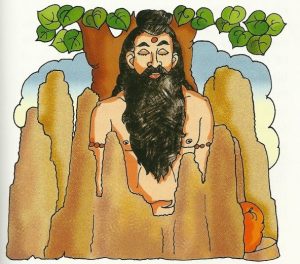 So, he rushed back to Nārada to tell him how sorry he was for all that he had done so far. “How can I make good my bad deeds, and become a good person?” Sage Nārada asked him to sit in meditation, and continuously chant the name of Rama till he returned. So Sage Valya sat at one place, and chanted ‘Rama-Rama’ without moving for many years till termite ants made an ant-hill (called ‘Vālmīki’) and completely covered his body. And therefore, he came to be known as Vālmīki. Finally, a Divine voice from heaven said that Īshvara is pleased with the devotion of Vālmīki and he can come out of the ant-hill. Rishi Nārada appeared and told Vālmīki that now he was a reformed person. He narrated to him briefly the life-story of Rama, who was then the King of Ayodhyā.
So, he rushed back to Nārada to tell him how sorry he was for all that he had done so far. “How can I make good my bad deeds, and become a good person?” Sage Nārada asked him to sit in meditation, and continuously chant the name of Rama till he returned. So Sage Valya sat at one place, and chanted ‘Rama-Rama’ without moving for many years till termite ants made an ant-hill (called ‘Vālmīki’) and completely covered his body. And therefore, he came to be known as Vālmīki. Finally, a Divine voice from heaven said that Īshvara is pleased with the devotion of Vālmīki and he can come out of the ant-hill. Rishi Nārada appeared and told Vālmīki that now he was a reformed person. He narrated to him briefly the life-story of Rama, who was then the King of Ayodhyā.
In the course of time, Vālmīki became a Saint and a great poet. He composed the Ramayana, the story of the beautiful character of Lord Rama. His first students were none other than Luv and Kush, the twin sons of Bhagavān Rama himself. When the two princes sang the Ramayana in front of Rama, he was greatly overjoyed. Rama confirmed that everything that is written in the Ramayana about his life is true.
The Ramayana written by him became famous all over the world. Even today, millions of people read the Ramayana and learn from the good virtues and deeds of Rama so that they can themselves lead better lives.

The life of Sage Vālmīki shows that even an evil person can become a Saint, if he starts worshipping Īshvara with full devotion and faith, and gives up bad deeds. If we want to give up bad habits, we should keep trying really hard and also ask Īshvara to help us. In the course of time, Īshvara will have mercy on us and He will help us become virtuous.
We can also worship Bhagavān by reading the Ramayana of Valmiki. In this holy book, we read about the good character of Lord Rama – how he always listened to his parents, spoke gently to everyone, took care of all, and was loyal to his friends and so on. Reading the Ramayana will influence us to become a good person like Rama.
Vālmīki was a robber and yet he became a Rishi and a saint by giving up his bad habits, and by worshipping Īshvara. Similarly, if we have any bad habits, we should try to leave them, and worship Bhagavān continuously to help us become good.
Shabari: the student of Rishi Mātanga
Bhagavān Rama and his brother Lakshmana were travelling through the forests of Southern India in search of Devi Sītā, the wife of Lord Rama, who had been kidnapped. They happened to pass by the Āshrama (hermitage) of Rishi Mātanga. In that hermitage, lived a humble, unintelligent and illiterate tribal woman named Shabari.
Everyone thought that she was foolish, and they made fun of her because she was ugly and simple-minded. But Shabari always did her work diligently in the Āshrama, served her Guru, and remembered Bhagavān in her heart. On his death bed, the Rishi told Shabari that her devotion will be rewarded and Rama would come Himself to her.
Many years later, when she heard that the Rama was coming in the direction of the Āshrama, her joy knew no bounds! She wanted to feed the most delicious fruit and berries to Bhagavān Rama to satisfy his hunger.
So she went around from one bush of berries to another, plucking berries on a plate. She chewed one-half of each berry. Whenever she tasted a delicious and sweet berry, she would store the non-chewed half of that berry in a bowl. When she came across a bitter one, she would throw the whole berry away.

When the Rama arrived, she offered Him a seat, and water, and then gave him the bowl of half-chewed sweet berries. In her excitement, she had forgotten that we must never give dirty food to our guests. Lakshmana felt disgusted that Shabari should have offered her half-chewed berries to Rama. But the Bhagavān was so touched by the simple devotion and love of the tribal woman that he ate the berries offered by her with great delight.
After He had finished the berries, Shabari folded her hands in Namaste, and asked Rama with great devotion – “O Lord! I do not know the correct way of worshipping you because I am a very lowly, ugly, and illiterate woman born in a degraded tribe. On top of that, I am not very intelligent or wise. Please tell me how I should worship you, and forgive me if I have offended you in any way.”
Lord Rama replied – “O beautiful lady! Listen to me. One should give up all pride due to one’s wealth, strength, good qualities, intelligence, or belonging to good families or caste. Instead of seeking praise from others, we should simply serve Bhagavān through our Bhakti and should praise Him alone.
A person who lacks Bhakti and faith is like that useless cloud that soars high up in the sky but does not shower any life-giving rain. Now I shall explain to you the nine paths of Bhakti. Pay attention and listen to what I say.
First, seek always the company of saintly and virtuous people. Second, instead of paying attention to useless talk, spend your time in listening to the biographies of Avatāras and Saints. Third, serve your Guru with humility. Fourth, give up all crookedness of heart, and sing the praises of the great qualities of God. Fifth, chant the holy Vedas and recite the sacred mantras, sing Bhajans, and pray whenever you can.
Sixth, follow what the good people do, keep your senses under control, and do a lot of good deeds. Seventh, treat everyone equally and see Me in everyone. Eighth, do not be greedy and be satisfied with what you get as a result of your labor. Also, do not see the faults in others, even in your dream, but always see their good qualities and encourage them. Ninth, be straightforward, do not show any cunningness, and have faith in Me alone with all your heart.
Rare is that man or woman in which you can see even one of these nine types of devotion. Dear Shabari, everyone makes fun of you. But I can see that in reality, you are the most beautiful woman because all these nine forms of devotion are practiced by you with great humility. Today, I will give you that reward that even Yogis and Saints do not get easily. I shall reveal my Divine form to you.”
And then Lord Rama showed his form as Lord Vishnu to her. Shabari’s soul then left her body and merged with Lord Rama. She attained Moksha as a result of her simplicity and simple devotion towards the Lord.
Rishi Ashtāvakra: The Jivanmukta
Rishi Kahor was a famous scholar of the Vedas. One day, he was chanting the Vedas in the presence of his pregnant wife Sujātā. Suddenly, the fetus spoke from inside his mother’s womb, “Father, you are not chanting the Vedas correctly.”
Kahor’s ego was hurt, and he cursed his own son, “You are a mere unborn infant. How dare you correct me! I curse you that you will be reborn with eight bends in your body.”
Before the baby was born, Kahor heard that King Janaka had organized a grand Yajna for which he was looking for suitable priests. Kahor reached the palace of Janaka and offered to help out.
But the king placed a pre-condition before he would hire the services of Kahor, “I am interested only in a priest, who is a greater scholar than my own court scholar Vandi. If you defeat him in a scholarly debate on the Vedas, you will be hired.
If you are defeated, you must drown yourself to death.” Kahor was confident of his knowledge and accepted the challenge. Unfortunately, he lost, and had to drown himself!

sometimes later, Sujātā gave birth to a baby. Due to his father’s curse, the baby had eight bends in his body. Therefore, he was named as Ashtāvakra, or ‘one with eight bends’. Despite his physical deformity and ugliness, Ashtāvakra became a great scholar of Hindu scriptures as a child. When he was twelve years of age, his uncle told him how his father Kahor had died because he had lost the debate with Vandi.
Ashtāvakra decided to avenge his father’s death. He traveled to Janaka’s court after impressing the guards of his knowledge. But when he entered the court, the courtiers and scholars present there started laughing at his deformed appearance.
Once the laughter ended, Ashtāvakra said, “I had come here to meet scholars, but it appears that the assembly of King Janaka comprises not of scholars, but cobblers.” The King and his courtiers and scholars were stunned at Ashtāvakra’s rebuke. But the child continued, “A scholar is he who looks beyond the body, which is nothing but a bag of leather we call the skin, and which encloses bones, blood etc. within it.
The scholar knows that this bag of leather is temporary and perishable. Only the Atma within it is real and survives death. But your so-called scholars looked only at my body and laughed. They had no idea of my Atma, which makes my body alive.”
King Janaka was very impressed by the wisdom of Ashtāvakra. But the boy then asked to debate with Vandi, with the same wager – if Vandi lost, he would drown himself to death. If Ashtāvakra lost, he would do the same. The debate resulted in Vandi’s defeat. But he would not drown himself, and instead said, “I am a messenger of Varuṇa, the Devata of water.
I cannot be drowned. Your father was not the only scholar who drowned himself to death. There were many others who lost the debate with me and suffered the same fate. And the truth behind this is that these scholars are not dead.
They were needed by my father for the performance of a Yajna. They were therefore immediately taken to the realm of Varuṇa an after they drowned. Now, that the Yajna is completed, and they can all return.”
As Vandi said these words, all the Rishis appeared from the water and walked on the river bank. Among them was Kahor, the father of Ashtāvakra. Kahor blessed his son for his devotion and asked him to take a dip in the river. When Ashtāvakra emerged from the water, his bends in the body had all disappeared and he had a normal physique like everyone else.
From this story, we learn that we should not judge a person based on his appearance. After all, the body is really like a leather bag inside which are contained bones, muscles, blood, and other organs.
A wise person knows that it is not the body, but the mind and the Atma inside the body that is important. A person becomes great or low not by how his body looks like, but whether his mind is pure or not.
The teachings of Ashtāvakra given in the court of King Janaka are collected in a scripture called the Ashtāvakra Samhitā. The story is contained in the Mahābhārata and in other scriptures.
Rishi Markaṇdeya becomes Immortal
Long, long ago, there lived a Sage named Mrikaṇdu and his wife Marudvati. They had no children and so, they prayed to Shiva to grant them a child. Bhagavān Shiva was pleased with their devotion.
He appeared to the couple and asked them to choose between a son, who would be very Dharmic and would be devoted to Shiva, but would live for just 16 years; and a hundred sons who will be foolish, but will all live long lives.
Since Sage Mrikaṇdu and Marudvati were a very virtuous couple, they asked for one son who will be wise, and devoted to Bhagavān, even if he were to live for only 16 years.
Soon thereafter, a son was born to the couple, and they named him Markaṇdeya. Just as Bhagavān Shiva had promised, Markaṇdeya grew up to be a very wise and Dharmic boy. However, as he got closer to sixteen years of age, he started noticing that his parents became sadder and sadder. He asked them for the cause of their sadness.
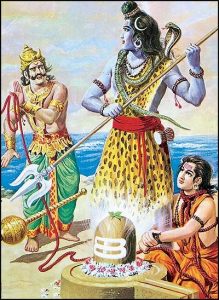
When he learned that he will die soon, he said – “Do not worry. I will worship Bhagavān Shiva to extend my life, because he answers the prayers of his true devotees.”
As he approached his sixteenth birthday, Markaṇdeya started worshipping Shiva in the form of a Linga. On his 16th birthday, Yamarāja, the Lord of Death appeared and started to pull Markaṇdeya’s Prana (life-force) out of his body. But Markaṇdeya did not get scared and continued to worship Bhagavān Shiva. He grabbed the Shivalinga with both his hands. Bhagavān Shiva emerged from the Shivalinga and stood in front of Yamarāja and stopped him. Shiva scolded Yamarāja and asked him to never harm his devotees.
Then, Shiva blessed Markaṇdeya with eternal life and told him that he will never die. Markaṇdeya later became a great Rishi, and one of the eighteen major Purāṇas is named after him. Devout Hindus believe that Markaṇdeya still lives on, invisible to us.
The prayer with which Markaṇdeya worshipped Lord Shiva is the Mahāmrityunjaya Mantra
(‘The Great Mantra of victory over death’) which goes as under –
Om! Tryambakam yajāmahey sugandhim pushtivardhanam |
Urvaarukamiva bandhanaat mrityurmukshiiya maamritaat ||
-Yajurveda (Mādhyandina) 3.60
“We worship the three-eyed One (Lord Shiva, Who can see the past/present/future) who is fragrant (i.e. whose glory is spread far and wide) and who nourishes all creatures. May He free us from death and lead us to immortality, just as a melon detaches from its creeper branch on its own upon ripening.”
When someone is very sick or has just died, this Mantra is recited for his benefit at least eleven times.
To be continued…
Explore Honoring our Gurus Part I
This Series was first published on India Facts.
Disclaimer: The facts and opinions expressed in this article are the personal opinions of the author. Indic Today does not assume any responsibility or liability for the accuracy, completeness, suitability, or validity of any information in this article.
Disclaimer: The opinions expressed in this article belong to the author. Indic Today is neither responsible nor liable for the accuracy, completeness, suitability, or validity of any information in the article.

